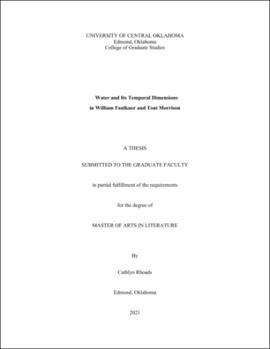| dc.description.abstract | William Faulkner and Toni Morrison offer narrative insight into the experience and implications of human's experience of temporality. This thesis constructs a narrative relationship between the two authors, exploring the ways in which the thematic circumstances offered by Faulkner contribute to the literary experience created by Morrison. These authors' exploration of the functions of time showcases Morrison's adaptation and revision of Faulkner's literary structures. Both Faulkner and Morrison associate water with time in relation to its movement as well as to its varying forms. The temporal aspects of water inform this structural analysis of selected novels by Faulkner and Morrison, ultimately showcasing Morrison's reconfiguration of what it means to experience temporality in the face of bias and partiality.The introduction to this thesis frames these ideas using Paul Ricoeur's Time and Narrative, which provides the basis for this thesis's examination of Faulkner and Morrison. Ricoeur's discussion of the function of time within the human experience, as well as his idea that human truths are found through and potentially limited by the construction and understanding of narrative, provides an important context for the search for temporal knowledge described by Faulkner and Morrison. Ricoeur's reading of Augustine as a foil for Aristotle helps to clarify Morrison's and Faulkner's relationship. Morrison's Playing in the Dark: Whiteness in the Literary Imagination, in turn, provides a critical context for discussing the differences between the two authors' novels. Morrison's assertion that an Africanist presence is crucial within Faulkner's construction of both self and place informs this study's discussion of temporality. Together, Time and Narrative and Playing in the Dark provide a framework for the thesis chapters that deal with specific works of Morrison and Faulkner and allows the two authors to serve as critical lenses for one another. Moments of reintegration, revitalization, and rejuvenation recur throughout the novels discussed in this thesis, and water, for the characters within Morrison's novels, provides a temporal passageway to self-realization and agency. For Faulkner, water may seem to offer the same opportunity, but its ultimate function is to reinforce the sense of doom and fatality that encompasses his characters. Chapter One discusses Morrison's Song of Solomon and Faulkner's As I Lay Dying, analyzing the temporal experiences of perceived history and the characters' journeys from conception to death. Morrison's Milkman achieves knowledge and freedom through the temporal agency of water, as he escapes from a sort of temporal alienation, whereas Faulkner's characters suffer repetitive entrapment within a closed temporal cycle. Chapter Two discusses Morrison's Beloved and Faulkner's Absalom, Absalom!, exploring the presence of ghosts and the question of what it means to live with an unfinished history. These novels deal directly with the traumas of human enslavement and war, as well as with the effects of these traumas on the movement of time for forgotten peoples. Once again, Faulkner's characters occupy positions of greater privilege and freedom, but they have a fatalistic relationship with time, whereas the characters in Morrison's novel are saved from their personal histories through the acceptance of community. Chapter Three pairs Morrison's Tar Baby and Faulkner's The Sound and the Fury in order to explore the production and materialization of temporality and its direct effects on what it means to be natural or to live naturally. Water once again provides a route to freedom for Morrison's characters, who struggle with what it means to be self-reliant, whereas Faulkner's novel enacts the doom of the Compson family through the circular movement of time, closing off the passageway that is offered by water. These pairings of novels confirm the complex and nuanced relationship and tension between Faulkner and Morrison's understandings of temporality and its relationship to human experience and self-actualization. The concluding chapter summarizes the thesis's exploration of water's role as a symbol for and medium of temporality by suggesting pathways for further research, opening up the possibility of a deeper analysis of temporality in other literary works, including the writings of Virginia Woolf and Octavia Butler, who likewise explore timeliness within narrative while also examining the effects that gender and race have on lived perceptions of time, as illustrated by Woolf's focus on bodies of water in her novel To the Lighthouse and Butler's temporal passageway from past to present through water in her novel Kindred. The conclusion also suggests an examination of the film adaptations of both Faulkner's and Morrison's novels that could expand and enrich the discussion of temporality in their works. | en_US |
